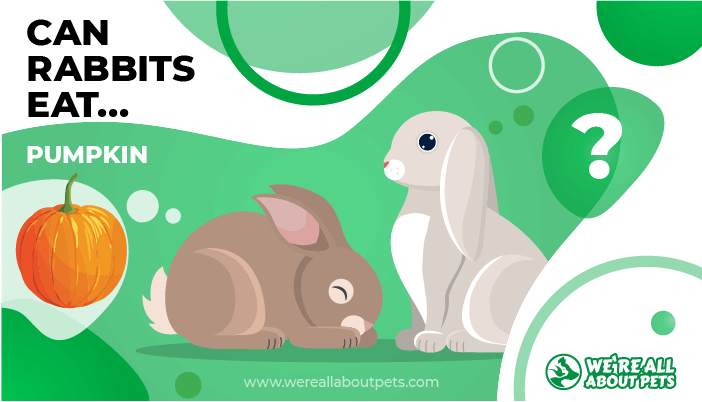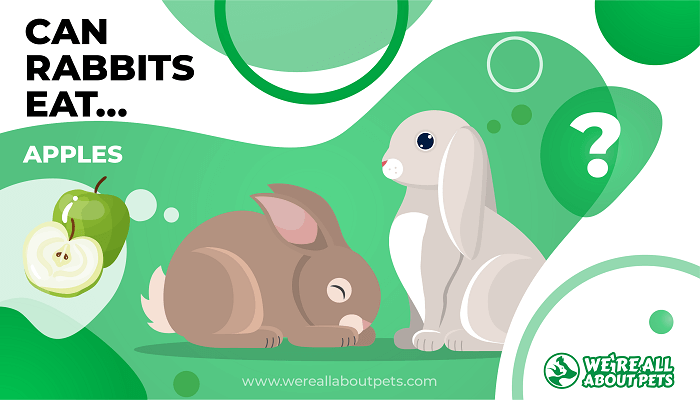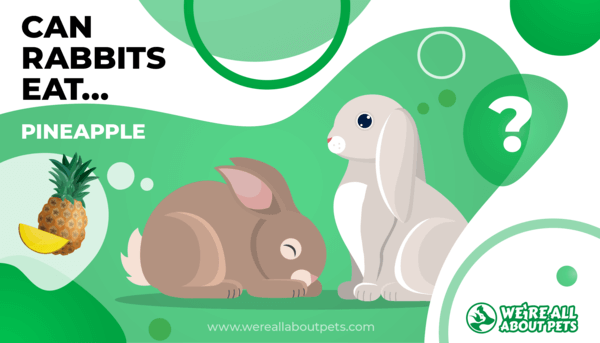Can Rabbits Eat Kale?
This page contains affiliate links. We may earn money or products from the companies mentioned in this post through our independently chosen links, which earn us a commission. Learn More
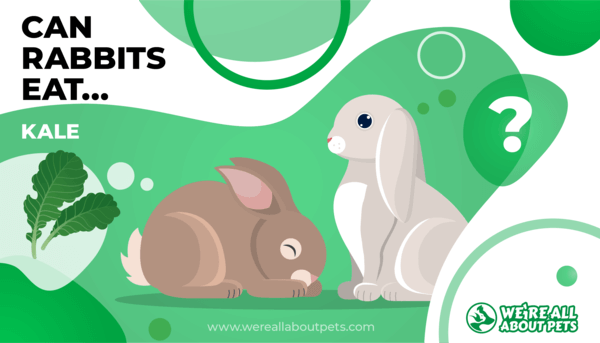
Kale is the quintessential rabbit food: It’s green, it’s healthy, and it goes well with all kinds of other vegetables.
Even though healthy eaters everywhere look to kale as an addition to smoothies, stir fries and salads, the concept of kale as rabbit food might be a little overblown. Can rabbits eat kale?
If so, is it possible to overdo it and feed them too much? The quick answer to your question is “yes,” rabbits can have kale – but maybe less often and in a smaller quantity than you originally imagined.
Let’s take a closer look at kale for rabbits.
Kale Nutrition Stats
If you like kale, you’ll be happy to know that you can eat lots of it without blowing your diet.
An entire cup of chopped kale offers approximately:
- 34 calories
- 7 g carbohydrates
- 5 g fiber
- 47 g fat
- 2 g protein
Kale Nutritional Facts

Kale is a nutritional powerhouse. This isn’t surprising, as it’s a member of the same family cabbage, broccoli, and cauliflower come from!
A one-cup serving of chopped kale provides about:
- 4 mg vitamin C
- 10302 iu vitamin A
- 299 mg potassium
- 1 mg iron
- 4 mcg folate
- 547 mcg vitamin K
- 5 mg calcium
- 8 mg magnesium
- 5 mg phosphorus
Can Rabbits Have Kale?
Yes, but in moderation, as kale can contribute to gas and bloating. In case you haven’t heard, rabbits cannot pass gas – so it’s up to us to help our bunnies stay comfortable and healthy by feeding them correctly.
Is Kale Good For Rabbits?
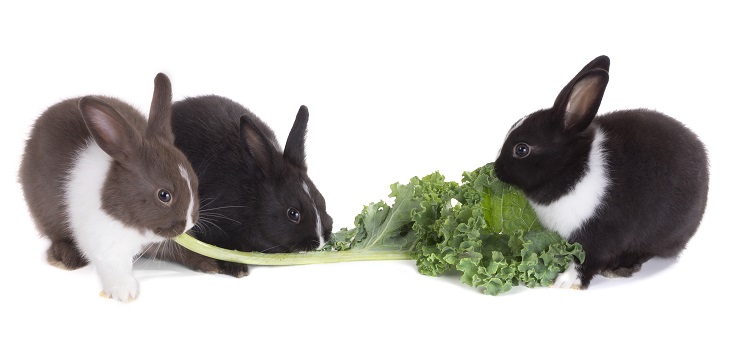
Kale is nutritionally superior and overall, it’s very good for rabbits. Remember to offer it in moderation and your bunny should be in good shape!
Do Rabbits Like Kale?
Yes! Most rabbits really like kale. There are a few outliers, and some bunnies might reject the bitter stems – but in general, bunnies like it when you feed them kale.
How Much Kale Can A Rabbit Eat?
Kale is relatively high in oxalates and calcium, which are two compounds that can contribute to kidney problems over time, when consumed in excess.
Here’s how much kale a to feed your rabbit:
| Age | Amount |
| Baby rabbit | None |
| Adult rabbit | 2 large kale leaves or 3 small kale leaves |
Even though kale is a good source of nutrients, it’s one of those veggies that can do more harm than good if consumed in excess.
There’s more you should know about kale for rabbits:
Since this leafy green can produce abdominal gas, you’ll want to introduce it gradually. Give your bunny one small kale leaf along with other foods they’re accustomed to.
Watch for signs of discomfort, bloating, and diarrhea over the next 24 hours. If there are no adverse side effects, you can offer a bit more next time and a little bit more the time after that.
Even though kale is good for rabbits, you’ll want to introduce it slowly instead of offering it all at once. Go ahead and give your bunny about half the recommended amount and watch for signs of diarrhea over the next 24 hours.
If all’s well, you can give your bunny rabbit the entire serving of kale the next day.
How Often Can A Rabbit Eat Kale?
Your rabbit can have kale 2 or 3 times per week as part of their leafy greens. Reduce the amount of kale you’re giving your rabbit if you notice that it seems to cause soft stools or abdominal bloating.
The Correct Diet is Important
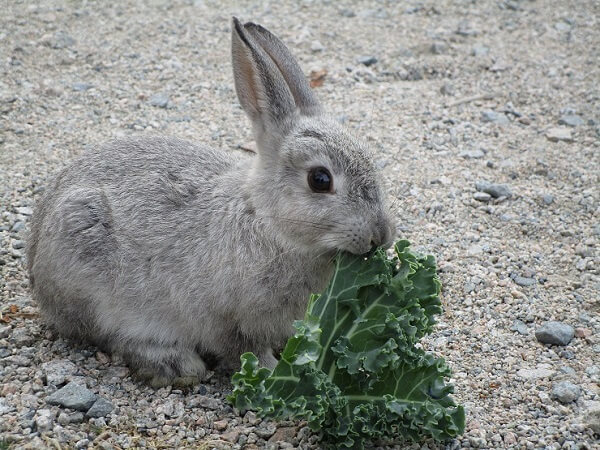
In the wild, rabbits eat kale when they find it growing in gardens – and they happily eat other members of the same plant family. Even so, kale doesn’t make up a large amount of a rabbit’s natural diet; instead, they mainly spend their active hours nibbling on grasses and other low-growing plants.
Since nature knows best, it’s important to keep your rabbit’s menu healthy. Here’s what to feed your rabbit each day:
- Clean, fresh water: Water is the cornerstone of a healthy diet for all animals, so be sure to make it available for your rabbit 24/7. Rinse and refill your rabbit’s water bottle every day.
- Rabbit pellets – Select a nutritionally complete, age-appropriate rabbit food for your bunny. The package will provide serving size information.
- Fresh hay such as Timothy – A wild rabbit’s natural diet consists mostly of grass. Since long grass fibers keep the digestive system moving, you’ll want to ensure that your bunny has ‘round the clock access to fresh hay.
- Approximately one cup of leafy green vegetables per two pounds of your rabbit’s body weight, plus a few crunchy veggies. Kale makes a good addition to your rabbit’s “salad” a few times per week.
- One tablespoon of seeds such as pepitas, pumpkin seeds, and/or sunflower seeds unless they’re already mixed into your rabbit’s food.
- Colorful vegetables and very small portions of fruit. Offer only tiny amounts of fruit – no more than about a teaspoon per two pounds of your rabbit’s body weight.
Here’s something new rabbit families don’t always know:
A rabbit’s teeth grow constantly! It’s important to provide plenty of rabbit chew toys such as untreated softwood sticks, coconut shell, or unbleached loofah help wear your bunny’s teeth down and prevent them from becoming overgrown.
What Are Other Healthy Alternatives To Kale In A Rabbit’s Diet?
Since your bunny needs lots of fresh, healthy veggies and as they need a good variety, you’ll want to mix things up. Here are some vegetables rabbits typically like:
- parsley
- basil
- beets
- beet tops
- carrot
- carrot tops
- cucumber
- celery
- romaine
- cabbage
- butter lettuce
- rocket
- buttercrunch lettuce
- endive
- escarole
- spinach
- arugula
- swiss chard
- parsnip
- bibb lettuce
- cauliflower
- green beans
- tomato
- watercress
- pumpkin
- zucchini
- winter squash
- summer squash
- bell pepper
- broccoli
- broccolini
While kale is among an entire rainbow of nutritious food for bunnies, some fruits and vegetables are toxic to rabbits.
It’s a good idea to take a little time out to conduct some research so that you can be well-informed about everything you feed your bunny, including knowing how much to offer and whether there are any steps you should take during preparation.
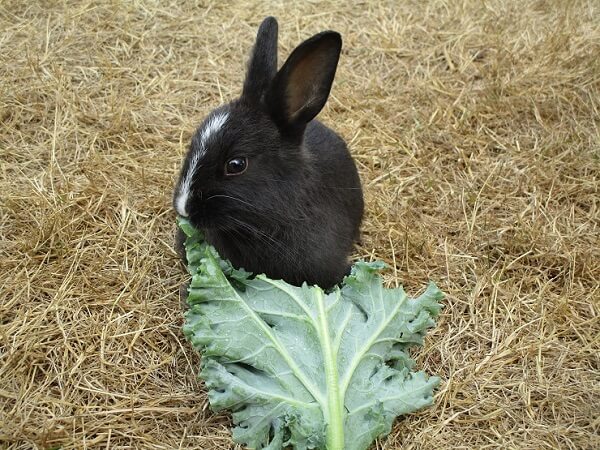
Giving your rabbit kale is a great way to enhance their weekly menu and treat them to some vital nutrients!
Frequently Asked Questions
Is kale safe for rabbits?
Yes, it’s safe to give kale to a rabbit. Just be sure to wash it well and cut it up to keep long, fibrous strands from choking your bunny.
Can kale make my rabbit sick?
Even though kale is a nutritious choice, too much can lead to gas and diarrhea. Remember to introduce kale to your rabbit’s diet slowly and you’ll be on the right track.
Can my rabbit have kale chips?
Dehydrated or freeze-dried kale without added fat or seasonings is good for rabbits but if the kale chips were made with any oil or spices at all, it’s best not to feed them to your bunny.






